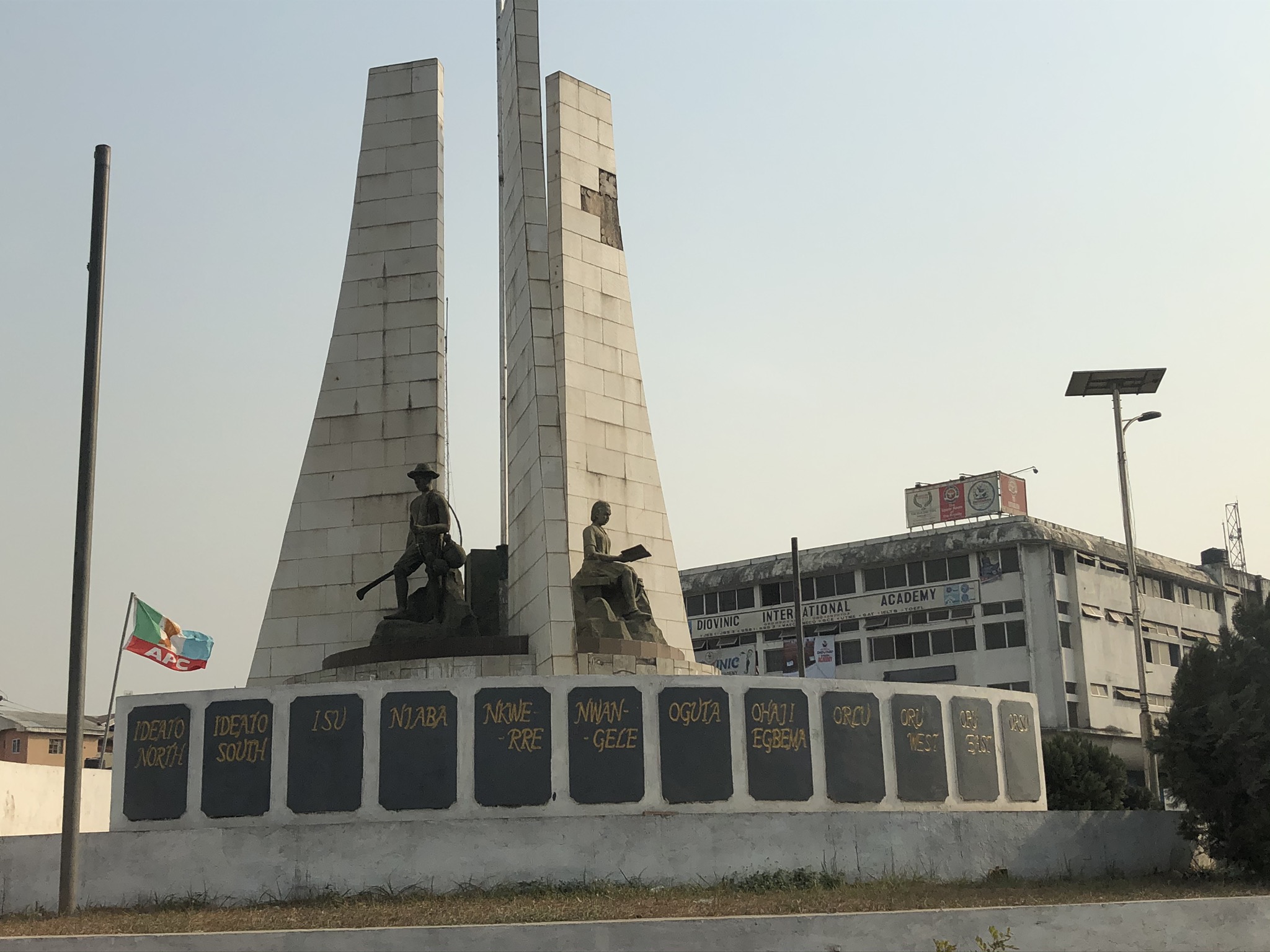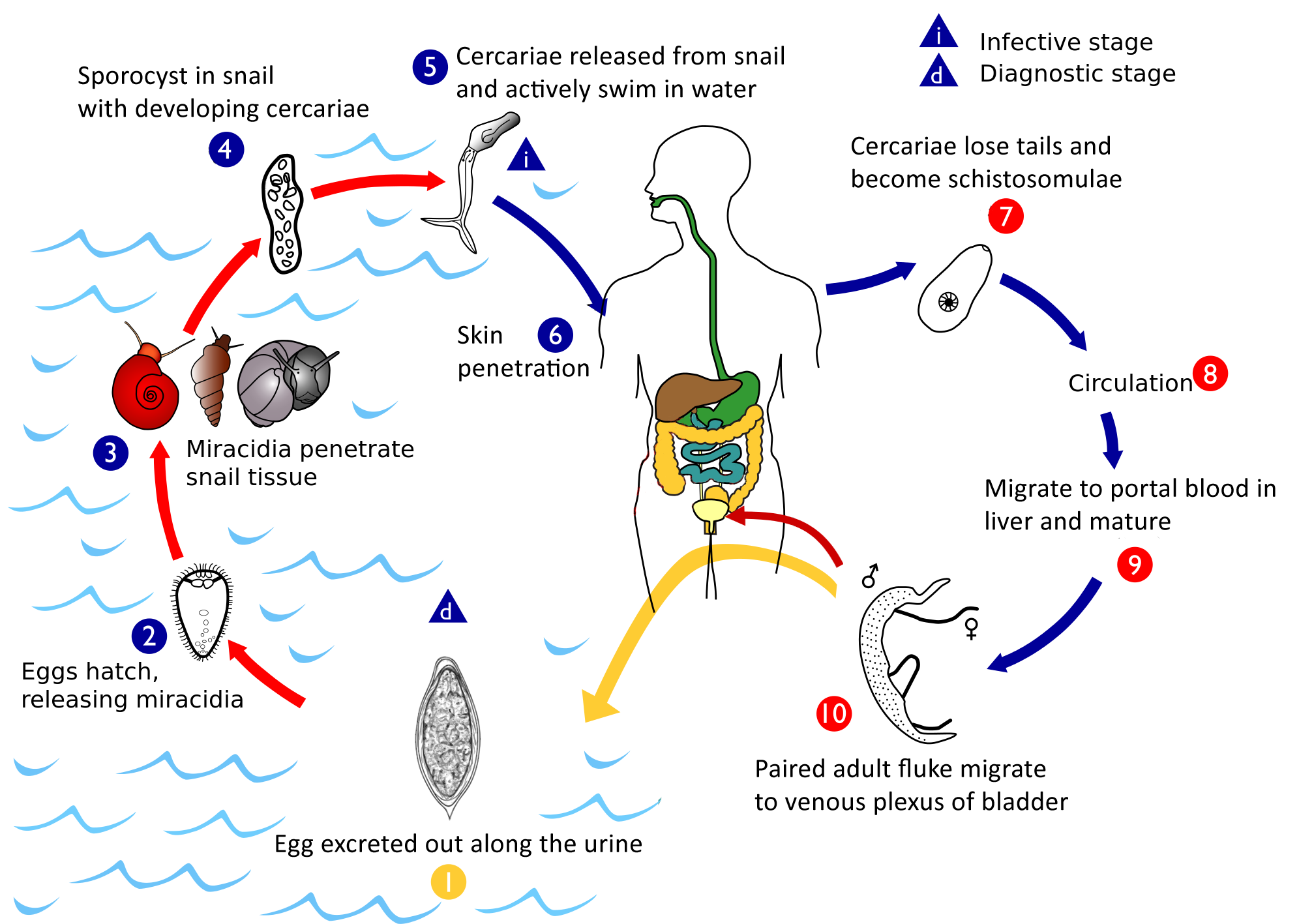|
Umuagwo
Umuagwo is a town in the Ohaji/Egbema Local Government Area (LGA) of Imo State in Nigeria. The population is mostly Christian and Igbo-speaking. The town lies on the Otamiri River downstream from Ihiagwa and from Owerri on the Port Harcourt road. Eze Tony Oguzie, Chairman of the Council of Traditional Rulers in the Orlu (Imo West) senatorial zone, is monarch of Umuagwo. Health Umuagwo is served by the Ohaji Medical Center. The town has a busy market which does not have any toilet or sanitary conveniences and is therefore insanitary, with high risk of contamination of the foodstuffs that are sold. In a 2006 study of the prevalence of Urinary schistosomiasis, a chronic parasitic disease caused by the trematode worm Schistosoma haematobium ''Schistosoma haematobium'' (urinary blood fluke) is a species of digenetic trematode, belonging to a group (genus) of blood flukes (''Schistosoma''). It is found in Africa and the Middle East. It is the major agent of schistosomiasis, th ... [...More Info...] [...Related Items...] OR: [Wikipedia] [Google] [Baidu] |
Imo State
Imo State ( ig, Ȯra Imo) is a States of Nigeria, state in the South East (Nigeria), South-East geopolitical zone of Nigeria, bordered to the north by Anambra State, Rivers State to the west and south, and Abia State to the east. It takes its name from the Imo River which flows along the state's eastern border. The state capital is Owerri and its state nickname is the "Eastern Heartland." Of the States of Nigeria, 36 states, Imo is the List of Nigerian states by area, third smallest in area but is List of Nigerian states by population, fourteenth most populous with an estimated population of over 5.4 million as of 2016. Geographically, the State is divided between the Niger Delta swamp forests in the far east and the drier Cross–Niger transition forests in the rest of the State. Other key geographical features are the state's rivers and lakes with the Awbana River, Awbana, Imo River, Imo, Orashi River, Orashi, and Otamiri River, Otamiri rivers along with the Oguta Lake in west ... [...More Info...] [...Related Items...] OR: [Wikipedia] [Google] [Baidu] |
Otamiri River
The Otamiri River is one of the main rivers in Imo State, Nigeria. The river takes its name from ''Ota Miri'', a deity who owns all the waters that are called by his name, and who is often the dominating god of Mbari houses. The river runs south from Egbu past Owerri and through Nekede, Ihiagwa, Eziobodo, Olokwu Umuisi, Mgbirichi and Umuagwo to Ozuzu in Etche, in the Rivers State, from where it flows to the Atlantic Ocean. The length of the river from its source to its confluence at Emeabiam with the Uramiriukwa River is . The Otamiri watershed covers about with annual rainfall of . The watershed is mostly covered by depleted rain forest vegetation, with mean temperatures of throughout the year. Conversion of the tropical rainforest to grassland with slash and burn practices is degrading soil quality. The Otamiri is joined by the Nworie River at Nekede in Owerri, a river about long. The Nworie river is subject to intensive human and industrial activities, and is used as a so ... [...More Info...] [...Related Items...] OR: [Wikipedia] [Google] [Baidu] |
Owerri
Owerri ( , ) is the capital city of Imo State in Nigeria, set in the heart of Igboland. It is also the state's largest city, followed by Orlu, Okigwe and Ohaji/Egbema. Owerri consists of three Local Government Areas including Owerri Municipal, Owerri North and Owerri West, it has an estimated population of about 1,401,873 as of 2016 and is approximately in area. Owerri is bordered by the Otamiri River to the east and the Nworie River to the south. The Owerri Slogan is ''Heartland''. History Owerri was the last of three capitals of the Republic of Biafra in 1969. The capital of the secessionist state was continuously being moved as Nigerian troops captured the older capitals. Enugu and Umuahia were the other capitals before Owerri. Present-day Owerri does contain some statuary memorializing the war, particularly in locations which suffered heavy bombing, but most war artifacts and history are located in the museum at Umuahia, Abia State. On 5 April 2021, a mass prison break h ... [...More Info...] [...Related Items...] OR: [Wikipedia] [Google] [Baidu] |
Chinwe Obaji
Chinwe Obaji is a higher education lecturer, teacher and education administrator who was appointed to heaNigeria's Federal Ministry of Educationin June 2005 as Senior Minister, and was succeeded a year later by Obiageli Ezekwesili. Background Chinwe Obaji was born in Ezinihitte-Mbaise in Imo State. She graduated from the University of Nigeria, Nsukka in 1975. From 1980 she was a lecturer and administrator at Michael Okpara College of Agriculture, Umuagwo, Imo State in Nigeria. Ministerial position Chinwe Obaji was the first female education Minister in Nigeria. As the Education Minister, she made efforts to resuscitate the Inspectorate Division of the Federal Ministry of Education. She started the one-meal-a-day project in some pilot primary schools across the country. She directed that Universities should administer the Post University Matriculation Examination to candidate students in an effort by bypass the inefficiency of the Joint Admission and Matriculation Board (JAMB) ... [...More Info...] [...Related Items...] OR: [Wikipedia] [Google] [Baidu] |
Christians
Christians () are people who follow or adhere to Christianity, a monotheistic Abrahamic religion based on the life and teachings of Jesus Christ. The words ''Christ'' and ''Christian'' derive from the Koine Greek title ''Christós'' (Χριστός), a translation of the Biblical Hebrew term ''mashiach'' (מָשִׁיחַ) (usually rendered as ''messiah'' in English). While there are diverse interpretations of Christianity which sometimes conflict, they are united in believing that Jesus has a unique significance. The term ''Christian'' used as an adjective is descriptive of anything associated with Christianity or Christian churches, or in a proverbial sense "all that is noble, and good, and Christ-like." It does not have a meaning of 'of Christ' or 'related or pertaining to Christ'. According to a 2011 Pew Research Center survey, there were 2.2 billion Christians around the world in 2010, up from about 600 million in 1910. Today, about 37% of all Christians live in the Am ... [...More Info...] [...Related Items...] OR: [Wikipedia] [Google] [Baidu] |
Igbo Language
Igbo ( , ; Igbo: ''Ásụ̀sụ́ Ìgbò'' ) is the principal native language cluster of the Igbo people, a meta-ethnicity from Southeastern Nigeria. The number of Igboid languages depends on how one classifies a language versus a dialect, so there could be around 15 different Igboid languages. The core Igbo cluster or Igbo proper is generally thought to be one language but there is limited mutual intelligibility between the different groupings (north, west, south and east). A standard literary language termed 'Igbo izugbe' (meaning "general igbo") was generically developed and later adopted around 1972, with its core foundation based on the Owerri (Isuama), Anambra (Awka) and Umuahia (Ohuhu) dialects, omitting the nasalization and aspiration of those varieties. However, nobody speaks "general Igbo" natively and it isn't accepted by all Igbo groups. The largest variety of the core Igbo cluster is Ngwa. History The first book to publish Igbo terms was ''History of the Missio ... [...More Info...] [...Related Items...] OR: [Wikipedia] [Google] [Baidu] |
Ihiagwa
Ihiagwa is a town in Owerri West Local Government Area of Imo State, Nigeria. It is located south of the capital city of Owerri. The township is composed of eight villages: Umuelem, Umuchima, Mboke, Nnkaramochie, Iriamogu, Aku/Umuokwo, Ibuzo and Umuezeawula. Ihiagwa has been divided into two autonomous communities, namely Ihiagwa Ancient Kingdom (Chimelem), comprising two villages: Umuelem and Umuchima;and Dindi-Ihiagwa, comprising the remaining six villages, all divisions done for administrative and developmental reasons. Each autonomous community is a monarchy ruled by an Eze. The Ihiagwa people are members of the Igbo ethnic group in the southeastern Nigeria. They number about ten thousand (10,000) and easily identified among the Oratta people of Owerri. The Ihiagwa people are also referred to as the Aguzieafors i.e. the calendar keepers. This means in those pre-British times the Ihiagwa were responsible for keeping the calendar of the surrounding communities and also had the d ... [...More Info...] [...Related Items...] OR: [Wikipedia] [Google] [Baidu] |
Schistosomiasis
Schistosomiasis, also known as snail fever, bilharzia, and Katayama fever, is a disease caused by parasitic flatworms called schistosomes. The urinary tract or the intestines may be infected. Symptoms include abdominal pain, diarrhea, bloody stool, or blood in the urine. Those who have been infected for a long time may experience liver damage, kidney failure, infertility, or bladder cancer. In children, it may cause poor growth and learning difficulty. The disease is spread by contact with fresh water contaminated with the parasites. These parasites are released from infected freshwater snails. The disease is especially common among children in developing countries, as they are more likely to play in contaminated water. Other high-risk groups include farmers, fishermen, and people using unclean water during daily living. It belongs to the group of helminth infections. Diagnosis is by finding eggs of the parasite in a person's urine or stool. It can also be confirmed by fi ... [...More Info...] [...Related Items...] OR: [Wikipedia] [Google] [Baidu] |
Trematode
Trematoda is a class of flatworms known as flukes. They are obligate internal parasites with a complex life cycle requiring at least two hosts. The intermediate host, in which asexual reproduction occurs, is usually a snail. The definitive host, where the flukes sexually reproduce, is a vertebrate. Infection by trematodes can cause disease in all five traditional vertebrate classes: mammals, birds, amphibians, reptiles, and fish. Etymology Trematodes are commonly referred to as flukes. This term can be traced back to the Old English name for flounder, and refers to the flattened, rhomboidal shape of the organisms. Taxonomy There are 18,000 to 24,000 known species of trematodes, divided into two subclasses — the Aspidogastrea and the Digenea. Aspidogastrea is the smaller subclass, comprising 61 species. These flukes mainly infect bivalves and bony fishes.https://www.biotaxa.org/Zootaxa/article/view/zootaxa.3918.3.2 Digenea — which comprise the majority of trematodes — ... [...More Info...] [...Related Items...] OR: [Wikipedia] [Google] [Baidu] |
Schistosoma Haematobium
''Schistosoma haematobium'' (urinary blood fluke) is a species of digenetic trematode, belonging to a group (genus) of blood flukes (''Schistosoma''). It is found in Africa and the Middle East. It is the major agent of schistosomiasis, the most prevalent parasitic infection in humans. It is the only blood fluke that infects the urinary tract, causing urinary schistosomiasis, and is the leading cause of bladder cancer (only next to tobacco smoking). The diseases are caused by the eggs. Adults are found in the venous plexuses around the urinary bladder and the released eggs travels to the wall of the urine bladder causing haematuria and fibrosis of the bladder. The bladder becomes calcified, and there is increased pressure on ureters and kidneys otherwise known as hydronephrosis. Inflammation of the genitals due to ''S. haematobium'' may contribute to the propagation of HIV. ''S. haematobium'' was the first blood fluke discovered. Theodor Bilharz, a German surgeon working in Cair ... [...More Info...] [...Related Items...] OR: [Wikipedia] [Google] [Baidu] |







